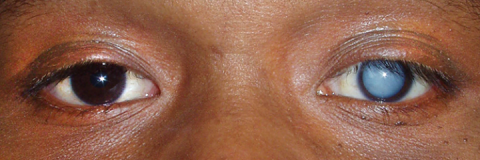
 Recently Jane, 80, developed funny sensation in her eye. “I would feel as if my left eye is tearing and whenever I rubbed on it, I noticed it was actually wet with tears,” she says. One day she closed her right eye only to realize that her left eye was not seeing at all. This prompted her to visit the hospital to seek help.
Recently Jane, 80, developed funny sensation in her eye. “I would feel as if my left eye is tearing and whenever I rubbed on it, I noticed it was actually wet with tears,” she says. One day she closed her right eye only to realize that her left eye was not seeing at all. This prompted her to visit the hospital to seek help.
Jane is one of the millions of people worldwide who lose their vision as a result of cataracts. Cataracts develop when the lens becomes opaque. The lens is the part of the eye through which the light passes to the inside of the eye. “Every year ten percent of the population develops cataracts,” says Douglas Kinoti, an eye expert based in Embu Level V Hospital Kenya. Cataracts are the leading causes of blindness worldwide with approximately half of the adults over fifty years of age developing the cataracts.
Causes of cataract
Congenital cataracts appear at birth and up to six months after birth. “It is genetical and can run within families. It is an emergency and should be treated within the first six months of life since the eye develops through stimulation by light and if light does not pass to the retina due to cataract, it leads to blindness.
To identify the congenital cataract, parents and health workers should look for the white reflex in the eye. The other cause of white reflex in a newborns eye is retinoblastoma, a devastating eye cancer.
Traumatic cataracts can develop when one sustains trauma to the eye. They can develop very fast, as soon as days post the eye injury.
Diabetic cataracts occur among people with diabetes when excess sugars in the body damage the lens leading to the cataract.
Senile cataracts occur with aging and are the most common. “The lens continues to grow as one ages with new layers of cells forming continuously hence with time cannot adjust its power. The cellular sodium-potassium pump that regulates water in the lens weakens with age leading to formation of cataracts.”
Other causes of cataracts include, smoking, excessive exposure to light, obesity, high blood pressure, previous eye surgery, prolonged use of steroid based medications, and intake of excessive amounts of alcohol.
Complications of cataracts
As the case with Jane, blindness is the most common complication of cataracts.
“Sometimes cataracts can lead to glaucoma, a condition where pressure increases within the eyeball leading to damage of the eye.”
Traumatic cataracts can result in eye pain.
Treatment
“Normally we do extraction of the lens with cataracts and replace it with artificial lens.”
“It is not possible to prevent development of most cataracts except in diabetes where sugar control can help. What we recommend is early detection and occasional eye examination for anyone above the age of forty who has farsightedness.”